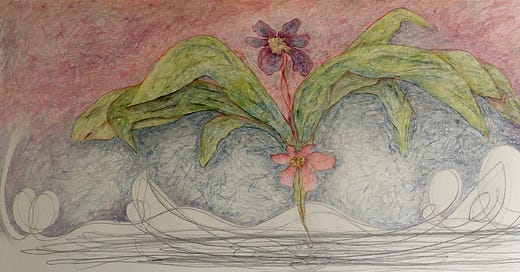How Art Heals: Remembering Wholeness
Part 2 of a Many Voices Conversation with Rosemary Starace
Part 2
Rosemary Starace and I invite you to join us in an ongoing conversation about the healing power of art. If you missed Part 1, you can read it here.
Susie Kaufman: My late spiritual director, an older Irish Catholic woman, always told me that I would know what I wanted to do because it would give me so much joy. I was in my fifties when I had the good fortune to meet Virginia and she took me by storm. The idea that what I was supposed to do with my life would bring me joy had never occurred to me. I had also never met God, with whom she was on intimate terms. I had rubbed elbows with Wholeness, but coming out of a mostly secular Jewish upbringing, the word God was deeply foreign. Over the twenty years that I sat with her before she died of Covid, these two introductions were her greatest contribution to my life, as if she had told me that she could further my art by putting me in touch with all the right people. Her two pieces of guidance were invaluable and in some way they mean the same thing. My authentic voice as a writer is the voice that God/Wholeness heard and recognized in me. As spiritual director Diane Millis, one commenter on Part 1 of this conversation, put it, “the primary aim of the art of writing is to reconnect and maintain connection with our original voice."
Rosemary Starace: Diane Millis’s comment goes to the heart of our conversation. And it is life-changing even to realize we have an original voice to connect with. As you discovered, it IS like “being introduced to all the right people.” That line made me laugh out loud—so good! Who are these “right people?” Our deeper selves. But have you noticed that the deep self (or God, who has any number of names) speaks in surprising ways?
The God of my youth had nothing to do with authenticity or joy. I thought God’s job was to force compliance and sacrifice—a relic of my mid-century Catholic education. But Catholicism also offered entry into mystery, and fed my curiosity about spiritual matters. And like you, I was occasionally gifted with tastes of the numinous. I didn’t know then that my inner push towards artistic expression came from a trustworthy, abiding source; I thought it was “just” rebelliousness and intransigency that moved me. As a young adult, I remember crossing out the word “God” in the familiar motto and making it read, “In Art We Trust.” It felt so right, like a sacrament even, and to this day there is an unobtrusive sign in my studio bearing those words, perhaps blasphemous and defiant, perhaps given to me by my original voice.
SK: Your phrase, “It felt so right” really captures what I’m thinking about. Writers spend a lot of time talking about “voice,” the way a person’s words are distinctly, uniquely their own. But in my experience, finding that voice is only the first step. After that comes owning that voice, loving that voice. My writing is highly condensed, sometimes to the point of being cryptic. It unfolds in the potentially argumentative coffee shop rhythms of the city, even though I haven’t lived there in more than fifty years. I am prone to being jokey and performative. I can no more write a languid pastoral sentence than I can write one in Russian. But that’s who I am. That’s my letter in Torah. Other people have admired my cadence in the past while I was still resistant to it. I struggled with the owning and the loving. But there’s something, “a trustworthy, abiding source,” as you so beautifully put it, that embraces us into the Wholeness and honors our various ways of expressing that belonging. I’m reminded of the verse from Isaiah, “I have called you by your name and you are My own.” In Art We Trust because in Art we can hear our own deep self calling back to us from out of the Wholeness and we recognize ourselves and love the music we make.
RS: I live to hear my true name spoken to me, and I seem to need to go listen for that call over and over, like a robin in spring. That may simply be an artifact of being human—lost, yet in love with the Caller, trying to shape one’s life on behalf of the Call.
Original voice became real for me gradually. I remember when I found myself wondering, early in my adult art life, “Now where did THAT come from?” of a phrase, a color, a metaphor. I came to see that these surprises were evidence of something larger than me that apparently used me as a medium of expression. Such experiences continue to thrill and reassure me. In them, I feel so connected—with my regular self, my deep self, the world around me. And joy comes in with the surprise. Now, after a lot of loss, I find such moments an antidote to loneliness.
It also thrills me that original voice speaks through our uniqueness and particularity. That’s your “letter in Torah.” Each person’s cadence, or touch of brush to page, or sweep of gesture is theirs and only theirs. And how wonderful that is. Our uniqueness is so profound and resplendent. Another thing I have to remember over and over. I have a friend who stopped making art for a while. I asked him, “Do you miss it?” He said, “I miss falling in love with myself.”
SK: It’s tempting to end this installment of our conversation about the healing power of art with your final electrifying and somewhat transgressive statement. There does seem to be a necessary note of blasphemy and defiance in rising out of the timidity of believing that art is something that other people do to a place of “falling in love” with oneself and one’s own voice. But when we do take that leap of faith, we inherit ownership not only of our own uniqueness but also of all the other unique voices creating meaning around us. We fall in love with the beautiful and suffering world.
RS. I couldn’t agree more, and I’m so glad you added your beautiful clarification. I wonder if readers have anything to share about their encounters with original voice in art or life, and whether it felt transgressive, liberating, or…? And whether “falling in love with oneself,” even for a moment, was part of it.
***************************************************************************************************
Many Voices will appear on the last Sunday of each month and will feature contributions from the community of paid subscribers. In August, just in time for the end of summer, Toronto writer Paula Halpin will return with her evocative essay, Time and Tide. All subscribers are now welcome to read and comment on Many Voices posts.
Please consider upgrading to a paid subscription to support seventysomething, have access to the archives, and become a contributor to Many Voices. Your ideas are always welcome.
*************************************************************************************************************
Copies of my 2019 essay collection, Twilight Time: Aging in Amazement, are available directly from me (signed) or from Amazon or your local bookseller.






Dearest Susie and Rosemary, Thank you for talking to one another and to us. I have read your beautiful and provocative reflections twice, each time being moved to what I call God-tears. I have no idea what God is. I write to God, every day. Sometimes, when I have written the shmutz out of me sufficiently, a poem shows up. Occasionally prose, too. I kind of see the writing as a collaboration between me and the God-thing. We’re not always good at our art, God and I, but every now and then I experience the blinding love you write about, and reread my poem in a state of wonder. I also know God talks to me in my own voice because it’s got a South African accent, is very bossy, and tells me how to do my life, a lot.
Dear Susie,
Ein Od Milvado - is one of my favorite phrases – it encompasses everything – the wholeness and the nothingness – just as does a work of art perceived by the viewer in the recesses of her mind and heart, created by the artist in her mind and heart and absorbed into the universe (Universe with a Capital U?) into the Divine Mind and Heart? It is in the everythingness and in the no-thingness that so much happens. I am flooded with work at this time, but am grateful to become part of this conversation. Thank you for initially writing. I hope I can keep involved with the conversation. Sending blessings, Leila